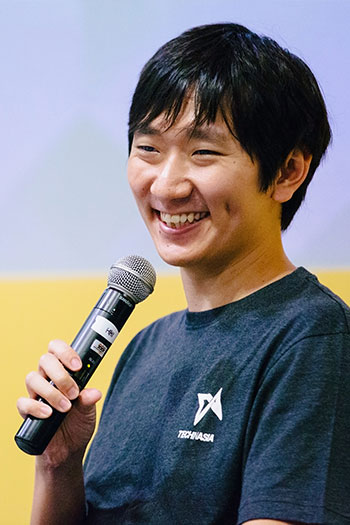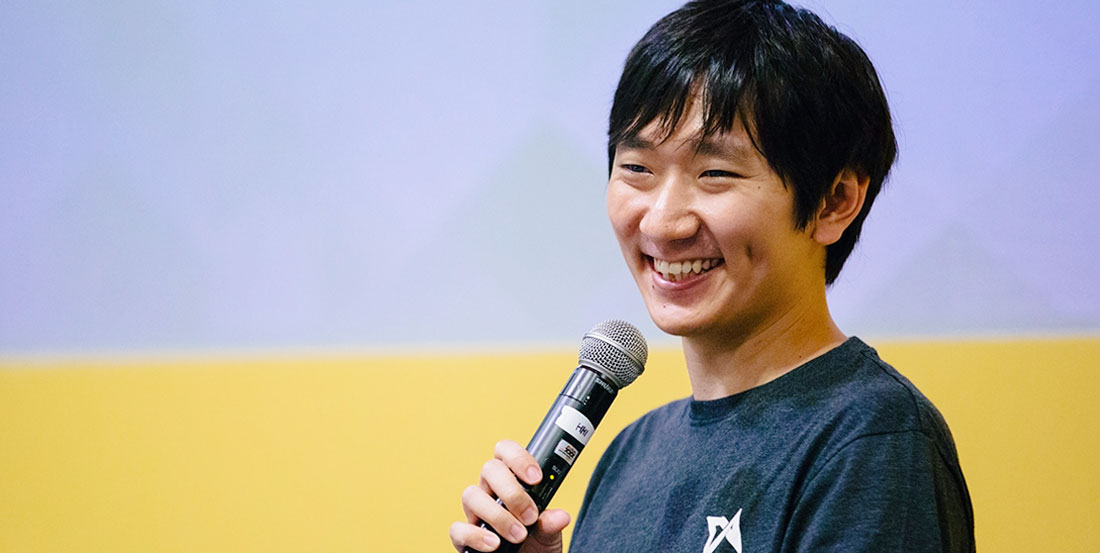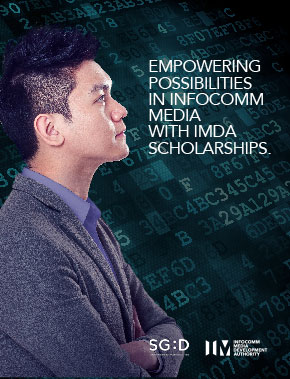The Infocomm Media Development Authority (IMDA) leads Singapore’s digital transformation with infocomm media. To do this, IMDA will develop a dynamic digital economy and a cohesive digital society, driven by an exceptional infocomm media (ICM) ecosystem – by developing talent, strengthening business capabilities, and enhancing Singapore's ICM infrastructure. IMDA also regulates the telecommunications and media sectors to safeguard consumer interests while fostering a pro-business environment, and enhances Singapore’s data protection regime through the Personal Data Protection Commission.
IMDA believes in grooming talents and leaders for the digital future. Vienna Wong, who has just graduated with a Bachelor’s of Arts from the University of Melbourne and is now a Studio Director in Channel NewsAsia, and Thia Kai Xin, Head of Data at Tech in Asia, were recipients of the Media Education Scholarship (MES) and National Infocomm Scholarship (NIS) respectively, awarded by IMDA. They give us an insight into their fruitful journeys thus far.
What is it about the ICM industry that enticed and excited you into wanting to be a part of it?
Vienna : The very fact that things are constantly evolving entices me. Change is exciting for a young graduate like me who is just starting out in the industry. There are ample things to learn in driving innovations and opportunities to participate in this progress. Who knows, maybe I will be part of the next big thing!
Kai Xin: The ICM industry is never static. Big data started as another buzzword until companies learned to leverage on the wealth of data that they were sitting on. Data science was just hype until we had the right people armed with the right tools to transform business processes. In the next few years, we will see similar trends in Artificial Intelligence (AI), Blockchain technology and more. ICM also spans across industries, from self-driving cars to real-time e-Commerce recommender systems to personalised healthcare plans. We are constantly leveraging on cutting-edge technology to improve the present and create the future.
What are your main roles and responsibilities, Kai Xin?
Kai Xin: I lead and work with cross-functional teams of data engineers, application/UI software engineers, QA/Validation, business managers and data scientists to build and deploy in-house solutions and work on large-scale data models. One such model we are working on in Tech in Asia is the jobs recommendation system that will match people based on their skillsets and interests to the most relevant openings among the startups on our platform. Our team is also in charge of building the data culture and creating tools that will empower other teams with data.

Thia Kai Xin
National Infocomm Scholar
Head of Data
Tech in Asia
How is the ICM landscape in Singapore transforming it into a SMART Nation?
Kai Xin: Singapore has the right mix of talents and infrastructure to attract big names like Google, Facebook, as well as unicorn startups like Lazada, Grab and Go-Jek, to setup their technology headquarters here. The rise of Southeast Asia as the next unicorn startup hotbed and the growing wealth of the region is attracting companies to use Singapore as a launchpad and experiment ground for new technologies. Ultimately, a SMART nation is driven by talents and talents are attracted by opportunities, which Singapore is rich for.
Share with us the unique versatility and practicality of an ICM degree in today’s corporate climate.
Vienna : Having an arts degree offers a variety of opportunities. Now that we are getting used to the idea of artificial intelligence in our lives, nurturing a creative mind is essential to cope with versatility that will attract opportunities. Therefore, that balance between hard and soft skills taught throughout my degree makes me feel more confident going into the working world, which will be highly applicable and useful in any industry regardless of what career path I pursue.

Vienna Wong Sze Ting
Media Education Scholar
Studio Director
Channel NewsAsia
What are your career aspirations moving forward in the ICM industry?
Vienna : Looking ahead, I hope to one day be able to produce content that can transcend different mediums. (e.g.: television, print, digital, etc.) With the industry constantly evolving, there is no guaranteed security in any one platform, and only by gaining experience and understanding different mediums will opportunities present itself. Media is always needed to keep the public entertained and informed, hence it will be exciting to participate in the production of content in whatever shape or form.
Kai Xin: Since I have started my career, I’ve had so many opportunities to learn and develop different skill sets. I was an associate engineer with EMC under the National Infocomm Scholarship where I was exposed to software and hardware systems that drove enterprise level analytics. Following that exposure, I joined Khoo Teck Puat Hospital's healthcare analytics team because I wanted to solve real-life problems. Our team worked alongside doctors, nurses and administrators to improve our patients' lives and it was very meaningful work. I then co-founded DataScience SG with my friends from SMU, where we run meetups, mentorship programs and workshops to level up the data skills of our members. However, I had a deep yearning to serve the technology community that has given me so much. When the opportunity to lead the data team at Tech in Asia came along, I jumped on the opportunity to build the next world-class data team, not just to serve Tech in Asia but other companies across Southeast Asia.
What I have learnt from my career so far being in this industry is that technology enables people to dream bigger, connect with others, and build the future. It is a privilege to be in the field and my career aspirations are to utilise technology to serve and enable others at Tech in Asia now.

